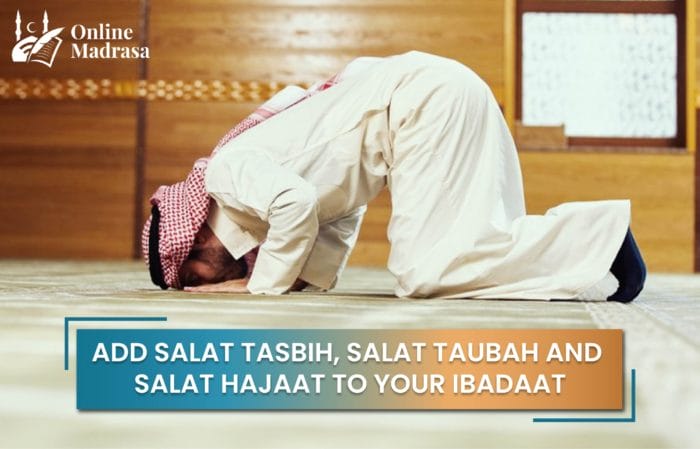Blog
Salat Tasbih, Salat Taubah and Salat Hajaat

[et_pb_section fb_built=”1″ admin_label=”section” _builder_version=”4.16″ global_colors_info=”{}”][et_pb_row admin_label=”row” _builder_version=”4.16″ background_size=”initial” background_position=”top_left” background_repeat=”repeat” global_colors_info=”{}”][et_pb_column type=”4_4″ _builder_version=”4.16″ custom_padding=”|||” global_colors_info=”{}” custom_padding__hover=”|||”][et_pb_text admin_label=”Text” _builder_version=”4.22.2″ background_size=”initial” background_position=”top_left” background_repeat=”repeat” hover_enabled=”0″ global_colors_info=”{}” sticky_enabled=”0″]
Add Salat Tasbih, Salat Taubah and Salat Hajaat to Your Ibadaat
Salat, being the second pillar of Islam, itself is the best way of worship and supplication. Apart from the salat that is obligatory five times a day, there is some Nafl salat that is offered for some specific purposes. Among this salat, Salat Tasbih, Salat Tauba, and Salat Hajaat are much esteemed before our Creator. Let us throw some light on the magnificence of these salat one by one.
Salat Tasbih
Salat Tasbih is one of the most valuable offerings that our beloved Holy Prophet (SAWW) has granted to us. This salat is the best way to please Allah Almighty. This is narrated in Abu Dawood and Tirmidhi that Prophet Muhammad (SAWW) asked his uncle Abbas (RA) to offer Salat Tasbih daily. He further said that if it is difficult to offer it daily then offer it once a week.
If not once a week then once a month and even if this also sounds difficult to offer so, then once a year. Again if it is difficult to offer once a year then offer Salat Tasbih at least once in your lifetime. This narration illustrates the significance of Salat Tasbih. According to a saying of our beloved Holy Prophet (SAWW), Salat Tasbih wipes away the sins completely, no matter whether they are big or small, committed willfully or mistakenly, hidden or revealed, old or new. Can we find anything bigger than it?
Method of Salat Tasbih
As obvious by its name, Salat Tasbih is a salat in which we read a tasbih to praise our Creator. This tasbih is as follows:
“Subhaan Allahi Wal Hamdulillahi Wa Laa ilaha illal Laahu Wallahu Akbar“
There are four Rakaat in salat tasbih and we have to read this tasbih three hundred times in this salat; seventy-five times in every rakaat. The order of reciting this tasbih in salat is as under:
- Fifteen times after Sana.
- Ten times before Ruku.
- Ten times in Ruku after glorifications.
- Ten times after standing up from Ruku.
- Ten times in first Sajda after glorifications.
- Ten times in Jalsa (between two Sajdah).
- Ten times in second Sajda after glorifications.
This count is repeated in all four Rakaat to complete the total count of three hundred. During this salat, you will go through a great spiritual experience that strengthens your connection to Almighty Allah.
Salat Taubah
None of us is absolutely innocent; all of us fall into sins now or then. But our Creator is The Most Merciful, so He taught us to offer Salat Taubah so that we may release the burden of our sins. Making Taubah or showing repentance upon the sins is one of the greatest virtuous acts.
Method of Offering Salat Taubah
Salat Taubah is quite simple in manner. There is no rigid course of action to offer this salat. It’s all about the intention of abandoning the wrongful ways and turning to Allah Almighty. For this reason, this salat weighs much before Allah Almighty. The method of offering this salat is as follows:
- Do ablution.
- Offer two rakaat of nafl salat with the intention of Salat Taubah.
- Ask Allah Almighty for forgiveness for the sins you committed.
- Make a commitment to Allah Almighty for not repeating the wrongdoings in the future.
- Adopt every measure to make sure to abandon the wrongful ways.
- Wipe off the sins by doing good deeds.
With the wonderful sensation of this salat, Allah Almighty showers His blessings and helps that person avoid wrongdoings.
Salat Hajaat
Hajaat means needs and Salat Hajaat means to offer two Rakat nafl salat to plea to Allah Almighty to ask for His help for any specific need. This salat is also provided by the Holy Sunnah as stated in Abu Dawood that whenever a problem appeared, our beloved Prophet Muhammad (SAWW) turned to salat.
Salat Hajaat is the best way to beg Allah Almighty for any permissible need. This salat can be performed at any time in day and night except the makrooh time of sunset and sunrise. However, the best time to offer this salat and make supplication is the middle third time of the night which is the time of salat Tahajjud. This moment is considered the best time to get closer to Allah Almighty and ask for His mercy.
Method of Salat Hajaat
The procedure of Salaat-ul-Haajat is as follows:
- Do ablution.
- Offer two rakaat nafl salat.
- After salaam, do not change the sitting posture so that your focus remains in the Salat Hajaat.
- Recite tasbih a minimum of ten times and as much as you can.
- Then recite Durood Sharif a minimum of ten times and as much as possible.
- With a strong belief in mercy and benevolence of Allah Almighty, make a keen dua with all humbleness and submissiveness. Keep full concentration on your need, the supplication, and the merciful nature of Allah Almighty.
You will experience the magical effects of this salat immediately. Allah (SWT) bestows serenity upon mind and heart with the blessing of this salat and gradually you get out of the difficulty.
There is a prescribed dua known as Dua e Hajaat which is as follows:
لا إِلَهَ إِلا اللَّهُ الْحَلِيمُ الْكَرِيمُ
سُبْحَانَ اللَّهِ رَبِّ الْعَرْشِ الْعَظِيمِ
الْحَمْدُ لِلَّهِ رَبِّ الْعَالَمِين
أَسْأَلُكَ مُوجِبَاتِ رَحْمَتِكَ وَعَزَائِمَ مَغْفِرَتِكَ وَالْغَنِيمَةَ مِنْ كُلِّ بِرٍّ وَالسَّلامَةَ مِنْ كُلّ إِثْ
But this is a weak hadith. The main purpose of the dua e hajaat is to include the necessary elements of dua that are praising Allah Almighty, reciting Durood Shareef, and making appeals to Allah Almighty for His help and favors for a rightful need or wish. So, the prescribed dua e hajaat may not necessarily be added to the salaat hajat.
Giving consideration to the reward and blessings of these three optional prayers, we the Muslims are lucky enough to have such amazing pieces of good fortune. Now, this is up to us how much light we bring to our lives from these three greatest sources. May Allah (SWT) help us lead a virtuous life.
Author Bio
Muhammad Junaid is a senior Analyst and Search Engine Expert. Extensive experience being a lead writer in Online Madrasa. Work for years with local and international enterprises. Also, represent well-known brands in the UAE.
[/et_pb_text][/et_pb_column][/et_pb_row][/et_pb_section]
